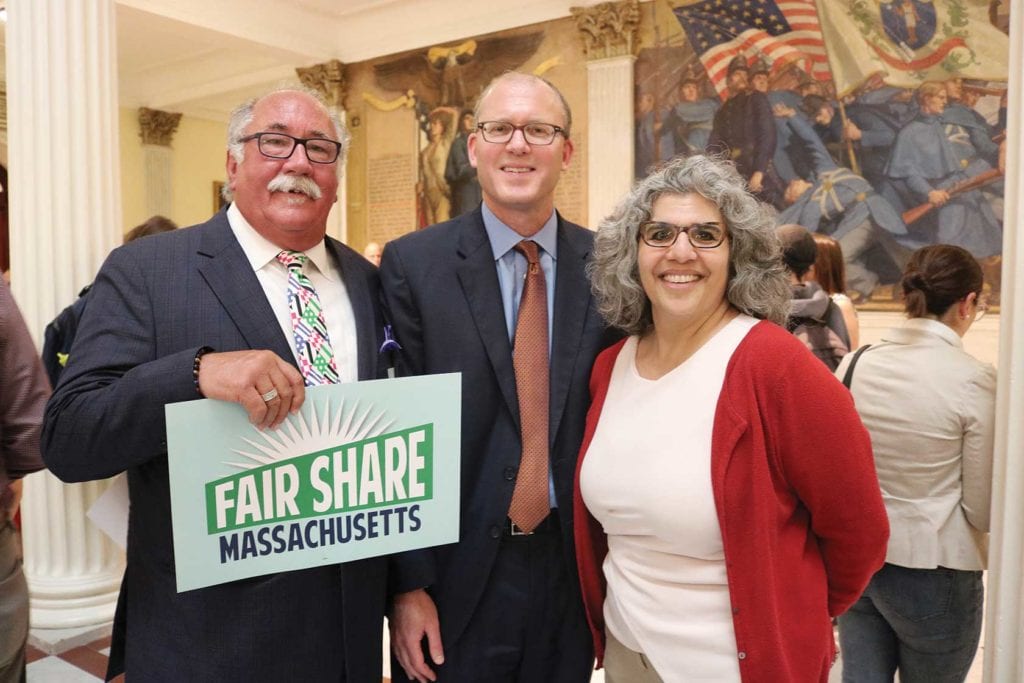Legislature advances Fair Share Amendment
Measure passes first constitutional convention

The Massachusetts Legislature last week advanced a constitutional amendment that would create an additional tax on annual income above $1 million in order to create revenue for public education and transportation funding.
The State Senate and House of Representatives passed the Fair Share Amendment, as the bill is known, by a vote of 147 to 48 in a constitutional convention Wednesday. It will have to pass another constitutional convention in the 2021-2022 legislative session, before it can be put to voters on the November 2022 ballot.
“Working families in Massachusetts are tapped out,” said Sen. Jason Lewis, one of the lead sponsors of the amendment, during the debate Wednesday. “They are having to bear the burden of the high cost of housing, healthcare, transit, childcare and other day-to-day expenses. Many of our constituents are barely getting by working multiple jobs and living paycheck to paycheck. Although they would benefit from greater investment in education and the transportation system, they cannot afford to fund it.”
The 4 percent “millionaire tax,” which would apply only to income after the first $1 million, was first proposed in 2015 by a citizens’ petition, and passed the state legislature in that year as well. However, it was struck down by the Supreme Judicial Court after a lawsuit was brought by the Massachusetts High Technology Council and other corporate interest groups.
Currently, the state income tax in Massachusetts is, on paper, a flat 5.05 percent for people of all income levels. However, there is more to the story, as state and local taxes combine to create a regressive, “upside-down” tax system. According to Marie-Francis Rivera, executive director of the Massachusetts Budget and Policy Center, low-income people pay a higher percentage of their income in taxes (10 percent) than do the wealthy (6.8 percent).
“There’s large income inequality that we’re seeing in our society. The tax system is essentially continuing to exacerbate the inequities that we’re seeing,” Rivera said. “Tax policy is a lever that can either change things in one way or another. Right now, it’s impacting poor people in disproportionate ways.”
Opponents of the Fair Share Amendment say that enacting it will hurt small business owners as well as drive wealthy residents out of the state, claims that the bill’s proponents say are unfounded.
“Most small businesses don’t see or rely on revenue over a million dollars,” said Rep. James O’Day, the House sponsor of the bill. “What small businesses do rely on is growth, employees who can get to work, a skilled labor force due to a well-funded education system — all of the issues which this amendment tries to accomplish.”
Waiting for funding
While the passing of the bill in this legislative session is promising, the tax will not go into effect until 2023 even if it does eventually become law. Activists say that that is too long to wait for more funding.
“Our students can’t even wait one more semester,” said Merrie Najimy, president of the Massachusetts Teachers Association. “The good news is there has been a lot of conversation across community and labor in Massachusetts to talk about putting together progressive revenue packages, beyond the Fair Share Amendment, that are critical to funding all public services in M assachusetts. We don’t have to wait for the Fair Share, but it is really important.”
Najimy also noted the state’s deteriorating transportation system, specifically mentioning two major subway derailments that MBTA vehicles suffered that week, leading to hours-long commutes and other difficulties for many riders.
Pablo Ruiz, an organizer with Raise Up Massachusetts, agreed, but said that the need for a better transportation system goes beyond Boston’s subway system.
“The need is consistent. Not just Boston fixing the train, which is urgent,” he said. “The need [in other parts of the state] is where there is no train, no bus lines.”
Rivera said there are options for raising revenue in the short term that the Legislature ought to be looking at, including raising taxes on capital gains, the estate tax and corporate taxes, among others.
However, she said that the Fair Share Amendment is the best option for the state.
“It’s the most clear-cut policy that would help fix our upside-down tax system and ensure that funds would go to education and transportation,” she said. “We’re a wealthy state and we can make this type of investment.”






